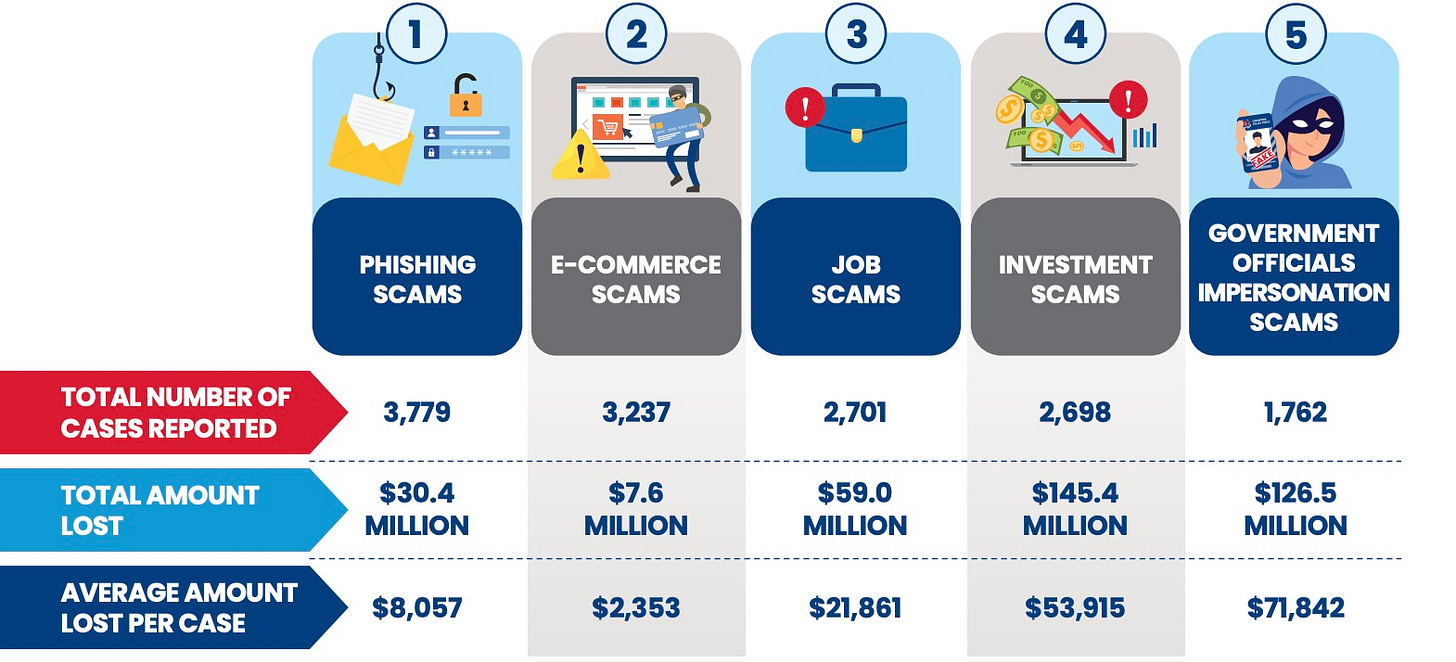Woman scammed by ‘astronaut’ + FYRE Festival fraudster gets into crypto + Trump's latest token
Scamurai weekly newsletter #8. Sept. 5, 2025.
- Scamurai -
Weekly newsletter #8. Sept. 5, 2025.
Have a story? Get in touch at callan@scamurai.io.
// Headlines
Donald Trump-backed World Liberty Financial rolled out its WLFI token to the public this week. Co-founded by the U.S. president, the token has (at the time of writing) already dropped 41% in value, from a high of $0.33 to $0.18. Even so, the Trump family’s on-paper crypto fortune is now estimated at more than $5 billion. The launch has brought renewed scrutiny to Trump and his family’s crypto ventures (see SW#1 on Trump’s projects), but the White House insisted there was no conflict of interest between Trump and his family’s projects and his pro-crypto agenda. Democratic Senator Elizabeth Warren dismissed it as “corruption, plain and simple.”
Yet not everyone has been able to enjoy the launch. One of the biggest holders, owning $75 million in tokens, Justin Sun’s wallet was blacklisted by the company after he moved $9 million. "Our address only conducted a few generic exchange deposit tests, with very low amounts, and then created address dispersion, without involving any buying or selling, which could not possibly have any impact on the market," Sun said on Thursday.
FYRE Festival fraudster Billy McFarland is back. After a botched attempt to organise a FYRE Festival 2 before selling the brand on eBay for $245,000, he is now a crypto bro. This week he announced the launch of PHNX. “I want to power every view on the internet,” he said. “$PHNX allows users to exchange the views they generate for IRL moments.” Whatever that means. He joins the swelling ranks of other unsavoury folk attempting to use their Netflix fame to launch shitcoins (see SW#2 on the Tinder Swindler).
OpenAI will introduce new parental controls for ChatGPT after it was sued for the role of its chatbot in the death of a 16-year-old boy. The company says it is working to better detect and respond to signs of emotional distress, but the boy’s parents argue that the safeguards come too late. The debate reflects wider tensions about child safety online, with platforms like Roblox tightening age checks and UK regulators sparking backlash over heavy-handed regulations.
Singapore has ordered Meta to crack down on Facebook scams impersonating government officials, the first such directive under its new Online Criminal Harms Act. Police say Facebook is the platform most exploited by scammers, and the company now faces fines of up to S$1 million ($776,000) if it fails to comply.
Get this newsletter delivered fresh and ironed to your email each week, with the latest news on scams, fraud and tech, as well as Scamurai’s latest investigations — all in one place! Every Friday morning at 8am GMT.
// A London investor lost a fortune in crypto. Police and KuCoin left him stranded.
By Callan Quinn
In August 2023, James Murray thought he’d struck gold. The London-based AI consultant had been investing in crypto for a while, and a bet on a Solana-based token had just delivered a handsome return.
And then it was stolen.
Busy moving house, he didn’t check his wallet every day. When he finally did, he discovered the entire balance gone and that the funds had been moved through several wallets before landing on a centralised exchange.
That gave him hope. If the funds had reached a large, regulated platform, perhaps they could be frozen and recovered. He first contacted the exchange itself and then the UK’s Action Fraud, the branch of the police that deal with scams, fraud and digital crime.
What followed was a familiar nightmare for victims of hacks and scams worldwide. Police struggled to handle a technically complex, cross-border case. The exchange was slow to cooperate. And the thieves cashed out long before anyone could catch up with them.
Read more:
// Scam sheet
An Japanese woman in her eighties was scammed into sending money to an individual posing as an astronaut who claimed he needed cash for oxygen. Police described the case as a classic romance scam that began on social media.
Thirty-six Chinese nationals have been charged in Malaysia over an alleged investment fraud scheme. The court denied bail and set the case for mention on September 12.
A hoaxer using the pseudonym Andrew Frelon has claimed responsibility for creating the AI-generated freelance journalist Margaux Blanchard. The claim comes via a new X account defending Blanchard after Press Gazette exposed her as fake, though the identity and credibility of Frelon remain highly uncertain. Several outlets removed articles by “Blanchard” following the revelation she and the sources quoted in pieces were not real.
LinkedIn will bring in new identity verification requirements for some users in a bid to tackle scams on the site.
// Hacks & Dark Markets
Vendors are selling date rape drugs on Telegram groups, according to research from Nominis. Among them is a drug packaged as chewing gum that the group’s moderators recommended be offered to women.
Police in the UK have warned against purchasing fake Mounjaro and Ozempic online. They are currently hunting a woman in connection with the sale of counterfeit medication following the seizure of £32,000 ($43,000) worth of fake drugs. Analysis of the haul found the medications contained more than four times the recommended dose.
The U.S. Department of State is offering a $10 million reward for information on three FSB-linked Russian hackers, Marat Valeryevich Tyukov, Mikhail Mikhailovich Gavrilov and Pavel Aleksandrovich Akulov. The three were charged in 2022 for involvement in a campaign targeting U.S. government agencies.
An English-speaking hacker gang may be behind both the hack of carmaker Jaguar and the Marks & Spencer attack earlier this year, according to private Telegram conversations seen by the BBC.
// Number crunch
Singaporeans lost about S$456 million (US$338 million) to scams in the first half of 2025, about S$66 million ($49 million) less than the same period last year.

Scam and cybercrime cases fell 21.5% to 22,476, though the median loss per case rose from S$1,100 ($815) to S$1,500 ($1,110).
// Scam factories
A Hong Kong police officer who took leave to visit mainland China has been confirmed safe after somehow ending up in a scam compound in Cambodia. Local media reported he was “tricked into working at a scam farm” and contacted a Hong Kong police station for help after fleeing the site. Over the past year, the government has received 29 reports of Hongkongers working in similar scam compounds in the region, with 26 of them having since returned home.
The Royal Thai Police have launched their first full-time joint operation with Japan and India to target Cambodia-based call centre syndicates. The initiative is part of a broader crackdown involving 10 countries and aiming to create a 24-hour cross-border system to track scammers, freeze illicit funds and coordinate investigations.
Fears over scams continue to hit Chinese tourism to Thailand. Chinese arrivals fell 39% year-on-year in July, dragging overall foreign visitor numbers down 7.2% so far this year. A similar pattern has been noted across Southeast Asia amid growing scam-related concerns.
// Crypto circus
Lee Eok-won, South Korea’s nominee for chairman of the Financial Services Commission, has sharply criticised cryptocurrency, calling it highly volatile and lacking in monetary function. He told lawmakers ahead of his confirmation hearing that virtual assets differ from traditional financial products like deposits and securities because they hold no inherent worth.
Crypto researcher ZachXBT leaked a spreadsheet revealing further examples of crypto influencers taking payment to promote tokens and failing to disclose the transaction to fans. Of the 200 influencers approached to promote a token, 160 accepted money to do so but less than five labelled their posts as advertisements.
Disgraced actor Kevin Spacey has unveiled his first directorial project in nearly 20 years. The film, also starring Spacey, is financed and conceptualised by Russian tech entrepreneur Vladimir “Lado” Okhotnikov, who faces U.S. federal charges for allegedly defrauding investors of over $340 million through the crypto platform Forsage.
De Nederlandsche Bank (DNB) has fined OKX €2.25 million ($2.45 million) for offering crypto services in the Netherlands between July 2023 and August 2024.without the legally required registration.
// Machines behaving strangely
A Victorian lawyer has become the first in Australia to face professional sanctions for using AI in court, losing the right to practise as a principal lawyer after submitting AI-generated false citations he failed to verify. The lawyer later admitted the list had been produced using AI-based legal software.
Independent music label Hallwood Media has signed a record deal with an AI-assisted artist. Oliver McCann, 37, a visual designer, began experimenting with AI to “bring some of my lyrics to life”. One of his tracks hit 3 million streams. “I have no musical talent at all,” he admitted. “I can’t sing, I can’t play instruments, and I have no musical background at all.”
New research from Florida State University suggests AI chatbots are influencing not just writing but how people speak. Words often overused by AI — such as “delve”, “intricate”, “meticulous” and “garner” — have surged in everyday speech, with some more than doubling in frequency.
// Law & disorder
Eliza Labs is suing Elon Musk’s X, alleging the platform tricked them into sharing AI tool details, then banned them and launched copycat products. The lawsuit claims X abused its monopoly power, harmed Eliza’s reputation, blocked access to customers and investors, and profited from the stolen innovations.
Reddit said its lawsuit against Anthropic over scraping its user posts isn’t a copyright case and should go back to state court. The platform argues that the moving of the case to federal court in July “invokes a disfavoured jurisdictional remedy” as Reddit’s state-law claims aren’t fully covered by U.S. copyright law.
Seven people have been indicted in Taiwan for defrauding 35 victims of nearly NT$97.43 million (US$3.17 million) through the messaging app LINE. The scam, run by a man surnamed Lin under the account “Winnie-the-Pooh Professional Crypto Dealer”, lured victims to invest in a Tether scheme over six months from February to August last year.
An Indiana lawyer named Mark Zuckerberg has sued Meta after his page was taken down for “impersonating a celebrity”. Meta said it had “reinstated Mark Zuckerberg's account, after finding it had been disabled in error”.
// Eyeroll
Another dodgy crypto casino has copied Stake’s playbook and is flooding X with advertising disguised as viral posts.
// Digital rights
The UK’s bungled rollout of the Online Safety Act is benefitting the companies that refuse to comply. The Washington Post found that of 90 porn sites it examined, the 14 that refused to comply with new ID verification to prevent access by children had seen a surge in UK customers.
Meanwhile the Australian government has claimed that an upcoming ban for social media access for the under 16s, which will come into force in December, can be enforced “privately, effectively and efficiently”.
Disney will pay $10 million to settle Federal Trade Commission allegations that the company allowed personal data to be collected from children on YouTube without notifying parents or obtaining their consent, as required by the Children’s Online Privacy Protection Rule.
The FTC and Utah are also taking action against Pornhub and affiliated sites for failing to block tens of thousands of videos featuring child sexual abuse material (CSAM) and nonconsensual content. As part of a proposed settlement, Pornhub’s operators must implement a program to prevent this content and pay a $5 million penalty. “Pornhub’s operators turned a blind eye… so it could profit off this exploitation,” said FTC official Christopher Mufarrige.
The European Council is set to finalise its stance on a controversial Chat Control proposal on September 12, which would require all messaging services in Europe to scan users’ chats, including encrypted ones, for CSAM. Opposition has grown to the rules, with the Czech Republic and Belgium joining Austria, the Netherlands and Poland in criticising the law’s privacy-invading provisions. Despite this, 15 member states still support the bill, which will be voted on in October.
// In other news
A Judge Lets Google Get Away with Monopoly. Google won this round. And Wall Street is rejoicing. (Matt Stoler/BIG)
// From the archives
Dirk de Jager wants you to believe that he's a success story in the world of online marketing. His Instagram pushes out the usual fare from self-styled gurus steeped in hustle culture to his 121,000 followers: a big house, luxury vacations and trite maxims about the secret to success. Yet many of his former clients say they were lured into a scheme of lead generation packages and a money-back guarantee — only to find it failed to deliver.
C2C promised bold results: “30 appointments in 30 days” and “3+ qualified sales calls per day in the first seven days”. Testimonials boasted "64 appointments in the first 30 days" and "$30k in sales”.
The major selling point, however, was the company’s guarantee: If clients didn’t double their investment in six months, they would receive a full refund. It seemed like a no-risk deal, so in August, Powell and her business partner, April Kerr, paid the company $6,000.
Things went wrong quickly.
Get this newsletter straight to your inbox every week by subscribing. If you can, consider supporting Scamurai with a paid subscription. All the money goes back into upkeep costs and building out the business.
Tips, vitriol and all other messages should be directed to Callan Quinn at callan@scamurai.io. Or get in touch below.









These are really cool. Keep em coming
Great roundup!